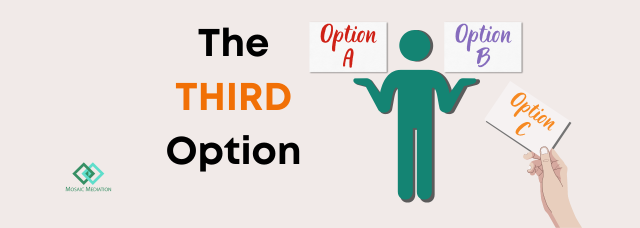The Third Option
The importance of considering all options in conflict resolution

Have you ever heard a ‘false dilemma’ logical fallacy?
You probably have, even without realising it – villain or victim, good or bad, yes or no…
Essentially, a ‘false dilemma’ is when you are presented with only TWO options – such as, you can choose between cheese or jam sandwiches – when other delightful sandwich fillings are also available to choose from. (I’m a big fan of the brilliant BLT sandwich!)
Applying this to an interpersonal scenario, an example could be someone presenting you with unnecessarily limited perspectives. Such as, “If don’t agree with me, you clearly don’t understand the situation.” Meaning that you can either agree and be considered reasonable, or you can disagree which means you have no idea! Clearly, there are other more reasonable options in this example which are also possible, such as agreeing in part rather than in full, or the speaker in this example potentially NOT being as knowledgeable as they’d like you to think. Or you may completely understand the situation!
In many similar scenarios, a third – or fourth, or fifth – option is often available. It just has not been realised or explored.
When having difficulties with another person, it is easy to fall into this ‘false dilemma’ way of thinking. Conflict conjures up so many confusing thoughts and feelings that we try to simplify the situation – sometimes, unfortunately, to the extent of an over-simplified fallacy.
A common pain-point in the employee relations situations I get brought in to help with is when they have been labelled along the journey, as ‘lazy’ or 'nasty' or – the big one – a ‘bully’. All these weighty words are hard to hear and leave a lasting sting, particularly if it feels like it is in total contrast to how you identify.
Many a time, I have had someone speak with great emotion about being accused in a grievance of ‘bullying behaviour’ and yet, they identify as a ‘kind person’. With the false dilemma way of thinking, it can feel like you can either be a bully or be kind – with no in-between. However, there is a third option! You can be a well-intentioned, kind person AND display behaviours which could be considered unkind.
You can be a person who gives of your time, or helps a colleague when they are struggling, or gives to charity…AND be someone who talks negatively about a colleague you are in conflict with. You can be a person who has been on the receiving end of harsh words and torment from another ‘bully’ yet also be someone whose words or actions have caused offense and pain too.
In the coaching world, some might refer to the ‘false dilemma’ fallacy as being a form of a limiting belief – one that prevents the coaching client from seeing the full extent of possibilities available to them. In a mediation, mediators often need to challenge a mediation participant to consider an alternative perspective to the one that they have believed for the extent of the period of conflict.
In all scenarios, the more entrenched a belief is, the harder it can be to consider a third option. However, using insightful questions, problem-solving, and digging into basis for forming that belief, a coach or mediator can skilfully empower the individual to see beyond the belief they have held onto.
An experienced mediator will help mediation participants to consider alternative perspectives on what has happened and will also facilitate discussions around out-of-the-box options to improve the future too. Also, in this latter discussion, ALL options are allowed at first (it is only later on that the feasibility of these options are examined further. This contrasting approach to ‘false dilemma’ thinking allows individuals to be creative and not feel like they are limited or powerless.
Mediation works so well in the 'grey area' of colleague disputes because the focus is not on hard evidence but on understanding and resolution. The intention is not to confirm who is the villain or the victim in a scenario but to provide a psychologically safe space to perhaps take responsibility for their contribution to the current situation and take ownership of what they will do to improve the situation.
So, as a challenge to you, when you are talking about a situation or considering your options, notice whether you are perhaps limiting yourself unnecessarily. Is there a third option you have yet to explore?
The author of this article, Emma Jenkings, is an accredited workplace mediator, interpersonal skills trainer, Peaceful Leadership Coach, and DISC Practitioner. For more tips on how to communicate assertively and practical methods for having productive, honest, and peaceful conversations, go to https://resources.mosaicmediation.co.uk to access a wide range of resources. For support in developing yours or your team’s communication skills, or for advice on handling workplace conflict, go to the Contact or Services page.










